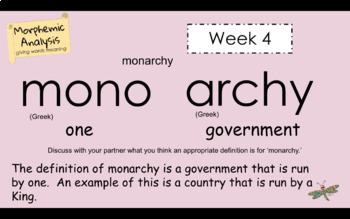a. Most commonly a suffix or prefix attached to a base word, stem, or root. (Words Their Way)
b. Made up of suffixes and prefixes that come before or after a word.
c.

d. This is important because this will help them to how to write and read words in the future. This will help them to see if the letters form together or not.
2. Morphemic analysis-
a. The process of analyzing or breaking down a word in terms of its meaning units or morphemes. (Words Their Way)
b. A concept of breaking down a word to figure out its meaning.
c.

d. This is important because this help the student to be able to break down the word and figure out the meaning of the word.
3. Inflectional endings-
a. Suffixes that change the verb tense of a word. (Words Their Way)
b. These change the tense of the verb by adding suffixes to the ending.
c.

d. This is important because this helps students learn how to properly see and know how the suffixes change the tense in a sentence.
4. Domain-specific academic vocabulary-
a. This includes content area, specialized, disciplinary texts, as well as general academic vocabulary used across content areas and disciplines. (Words Their Way)
b. The area that expresses speciation about a topic.
c.

d. This is important because this helps students learn how to use words like this in a sentence. Also, to show what those words entail.
5. General academic vocabulary-
a. This includes content area, specialized, disciplinary texts, as well as general academic vocabulary used across content areas and disciplines. (Words Their Way)
b. A concept where you know the content areas of a subject.
c.

d. This is important because this helps students learn how to use words like this in a sentence. Also, to show what those words entail.
No comments:
Post a Comment